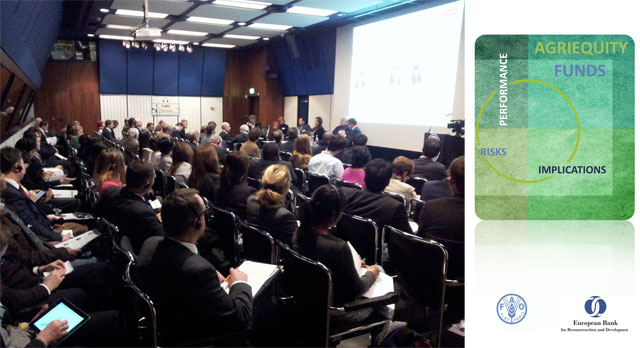FAO fuels debates at Global Forum for Food and Agriculture, Berlin, January 2013

To promote responsible investment in agriculture worldwide, FAO actively participated in the 2013 session of the Global Forum for Food and Agriculture (GFFA). The Forum, which took place in Berlin from 17 to 19 January 2013, is one of the best attended platforms of discussion on food and agriculture. Participants included representatives from government, private sector, universities and civil society. The event culminated with an Agriculture Ministers’ Summit, which gathered ministers from 80 countries this year. The general theme of the 2013 edition of the GFFA was “Responsible investment in the food and agriculture sectors”. To fuel the debate, FAO's Regional Office for Europe and Central Asia (REU) and the Investment Centre Division organized two expert working panels.
The first panel, focusing on the role of agricultural cooperatives in transition countries, addressed the opportunities and constraints met for the development of cooperatives in post-Soviet economies. Panelists included experts from Copa-Cogeca -- the Organization of European Farmers and Cooperatives -- the Ukrainian Grain Association, the European Bank for Reconstruction and Development (EBRD), and representatives from agribusiness companies from the Russian Federation and Hungary.
The discussion highlighted the hesitance of farmers in post-Communist countries to create or join cooperatives, which they still associate with past experiences of collectivization. Regional examples illustrated alternative models of agricultural development, with large agribusiness enterprises leading vertical integration processes. Panelists noted that, in countries where cooperatives have been successful – for instance in the United States and in most Western European countries – the latter have been encouraged by a clear legislative framework and a series of incentives, including tax incentives, which are not yet in place in transition economies.
The second panel, looking at the role and performance of agricultural equity funds in transition countries, presented the initial findings of a study conducted under the FAO/EBRD Cooperation. Agricultural equity investments in primary agriculture started to appear in the region in 2006-2008 with the spike in agricultural prices and expectations of farmland price increases. A lively panel discussion featuring agricultural finance and equity funds experts, representatives from FAO and EBRD followed the presentation of the study conclusions.
The discussion addressed existing and planned investment in agricultural land and primary production in terms of returns, risks, business models and observed trends. Panelists agreed that these funds are still in a “trial and error” stage, which causes many investors to proceed cautiously. The study revealed that publicly-listed companies have often underperformed, a problem that was attributed primarily to the difficulty to identify good management, untested business models and political risks. Panelists agreed that, while carrying risks, these investments present opportunities for local communities and knowledge transfer. In this area, it was noted that the involvement of donors and multilateral institutions was providing space for experimentation and introducing responsible business practices, i.e. maximizing positive spill-overs and limiting potentially negative environmental and social effects. It was also agreed that fund managers have a role to play in educating investors about the specific features of land and agricultural production that make them assets, and about the reality of a longer term investment horizon.
For both panel summaries and related documents, please click here.
